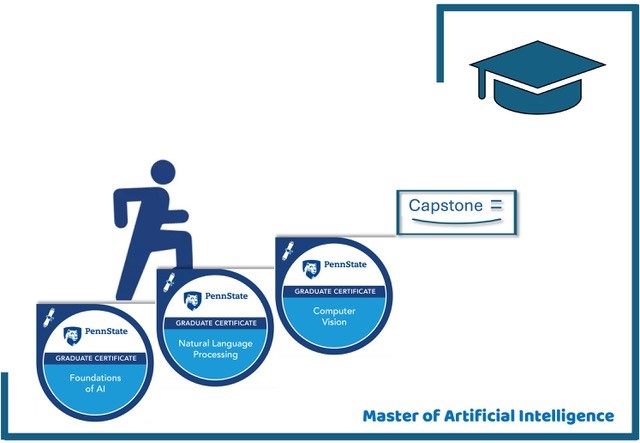In today’s business environment, problems that pop up may slow down or even shut down operations, technology, communications, and more. The ability to implement solutions efficiently but also effectively is invaluable in such a fast-moving world.
Advances in artificial intelligence are transforming problem-solving by reducing time and the chance for human error. Artificial intelligence frees up employees to focus on more meaningful work and optimize business processes. Artificial intelligence can process vast data sets and leverage its algorithms to perform a wide range of tasks, including classification, forecasting, and object detection. Additionally, it has the capability to generate diverse content formats such as text, programming code, images, audio clips, videos, and even DNA sequences, to name a few.
How can working professionals acquire practical knowledge and skills in AI, intelligent systems, and algorithm design to develop these types of solutions?
A degree in artificial intelligence that is offered online makes it possible for working professionals to become proficient in AI principles and technology without leaving their jobs.
Penn State offers an artificial intelligence master’s degree online, through Penn State World Campus. Its online courses provide a deep understanding of AI, machine learning, computer vision, natural language processing, and more.
A unique approach to teaching and learning AI
The Master of Artificial Intelligence is a 33-credit interdisciplinary degree program that prepares students to design, develop, and deploy data-centric AI systems and AI-enabled services and applications.
This artificial intelligence degree is being offered online through Penn State World Campus by Penn State faculty with expertise in artificial intelligence, data science, computer science, business, and social sciences. The degree program combines core courses in the foundations of artificial intelligence with electives and a culminating project.
As students progress through their artificial intelligence courses, they will be challenged by learning objectives around identifying and tackling real-world challenges. Students’ experience will culminate in a capstone project, in which they will have the opportunity to further develop AI solutions for real-world problems, applying the cumulative knowledge they’ve gained and adopting a problem-solving approach.
Course work in artificial intelligence
The curriculum of the artificial intelligence program is structured to provide a comprehensive education in AI and to keep pace with the latest advancements in the field. Students are encouraged to find datasets, brainstorm innovative solutions, and define business objectives, ensuring their projects have real-world relevance and social value.
Here are some examples of the required courses:
Deep Learning
In the Deep Learning course, A-I 570, students delve into neural networks and deep learning techniques. They explore convolutional neural networks (CNNs) for image recognition and recurrent neural networks (RNNs) for sequence generation. This course equips students with the skills to design and implement deep learning models for various applications.
Foundations of Artificial Intelligence
This course, A-I 801, provides an overview of core AI concepts, including intelligent agents, knowledge representation, reasoning, and machine learning. Students gain a solid foundation in the principles and techniques that underpin AI, preparing them for more advanced topics.
Natural Language Processing
The Natural Language Processing (NLP) course, A-I 574, covers both basic and advanced concepts such as language modeling, text-to-speech generation, and natural language understanding and generation. Students learn to design applications such as sentiment analysis, language translation, and chatbots. The course emphasizes the practical application of NLP techniques to solve real-world problems involving human language.
Machine Vision
In the Machine Vision course, A-I 879, students explore techniques for processing and analyzing visual data. This includes image recognition, object detection, and video analysis. The skills gained in this course are crucial for developing applications like autonomous driving and facial recognition systems.
Electives
In addition to the core courses, students can choose from a variety of electives to tailor their education to their interests and career goals. Electives may include topics like reinforcement learning, data science topics such as data mining and data visualization, predictive analytics, and more.
Projects and capstone
Throughout most of their courses, students will work on multiple projects in collaboration with teammates, as well as hands-on assignments and quizzes. A student's last project will take place in the capstone course.
For the course-based projects, students will submit a project proposal and business case to their professor. They will also be required to identify data sets and state-of-the-art AI algorithms they can use to develop innovative solutions.
In the capstone course, A-I 894, students apply their gained knowledge and advanced AI techniques to a real-world problem. They work closely with the faculty to develop a project that demonstrates their ability to design, implement, and evaluate AI solutions.
This project not only showcases their skills but also provides valuable experience that can be directly applied to their careers.
Real-world applications and success stories
The program has already seen numerous success stories.
Students from diverse backgrounds, including social sciences, electrical engineering, and the federal government bring a wealth of experience and unique perspectives to the program. This diversity enriches the learning environment and broadens the scope of AI applications explored.
The first students to graduate with a master’s in AI finished in 2023.
One of the graduates works as a research and development engineer who enrolled in the program to learn how to use AI in his work. For one of the course-specific projects, he created an NBA draft projector.
For the capstone project, the student and a classmate designed a chatbot with generative AI capabilities, trained on technical documents from a federal government agency to answer questions about regulatory standards.
Another recent graduate learned AI for two separate goals. He wants to use AI in computational linguistics, and he is working on a startup company for a project management tool.
Graduate certificates
Penn State World Campus offers a new path to earn a master’s degree in artificial intelligence, through stackable credentials. Students can complete the master’s degree while also earning three graduate-level certificates.
The first certificate that can be completed is Foundations of Artificial Intelligence, which consists of courses in the foundations, analytics programming in Python, predictive analytics, and applied statistics.
The student would complete two additional certificates, Natural Language Processing and Computer Vision, plus the required capstone course to earn the master’s in artificial intelligence. Students interested in a degree program must apply and be accepted prior to completing 15 credits.
Once an applicant is accepted to enroll in one of the certificate or degree programs among the participating stackable credentials programs, the application fee for any associated programs in the stackable credential pathway will automatically be waived.
A Penn State degree online
Penn State World Campus has been offering a Penn State education online for more than 25 years, with a comprehensive selection of more than 200 degrees and certificates now available.
Students applying for admission to the master’s in AI program should hold a bachelor’s degree in computer science, engineering, or mathematics. Those with degrees in other disciplines will be considered based on their prior course work.
Learn more about the Master of Artificial Intelligence that is offered online through Penn State World Campus.


